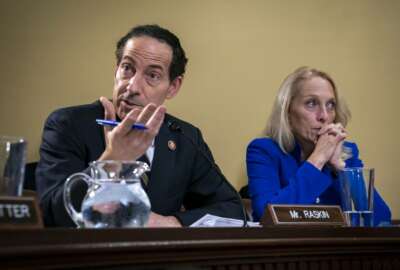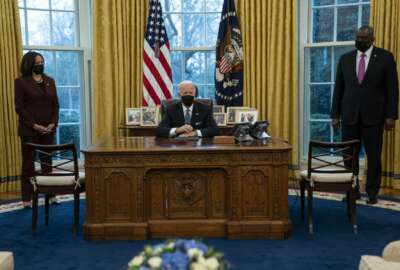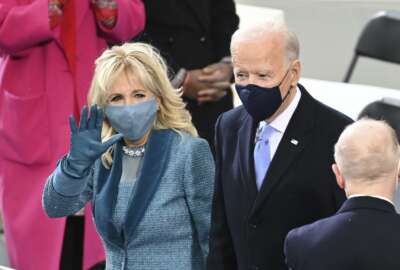
Agencies should offer leave to federal employees to get vaccines, new task force says
Agencies should offer administrative leave to federal employees to get a COVID-19 vaccine, the Safer Federal Workforce Task Force says. The task force also...
The Biden administration’s Safer Federal Workforce Task Force has new details on how agencies should handle leave, labor unions and mask mandates during the ongoing pandemic.
Notably, agencies can and should offer administrative leave to federal employees for the purposes of getting a COVID-19 vaccine, the task force said in a series of new frequently-asked questions.
“An agency head (or authorized designee) has discretionary authority to grant administrative leave in appropriate circumstances,” the FAQs read. “To facilitate expeditious vaccination of the federal workforce, agencies should offer leave-eligible employees a minimum of four hours of administrative leave per dose to use as needed— for a minimum total of eight hours of leave for employees receiving two doses.”
Employees may need less time to receive the vaccine and should only take the amount of leave needed to get their doses, the task force said. Others may need more time, for example, to travel to receive the vaccine.
Teleworking employees must get advanced approval from their supervisors before taking leave to receive a vaccine, the task force said.
The guidance from the task force comes shortly after Rep. Don Beyer (D-Va.) and a group of other Democrats in the National Capital Region asked the Office of Personnel Management to give federal employees the option of using administrative leave for vaccinations. They said the practice would encourage federal employees to seek out the vaccine.
The Safer Federal Workforce Task Force, led by the Office of Personnel Management, General Services Administration and White House COVID-19 response team, is the product of President Joe Biden’s mask mandate executive order, which he issued on his first day in office.
These FAQs are designed to help agencies implement that mandate, the task force said, along with recent COVID-19 safety guidance from the Office of Management and Budget.
“Protecting the health and safety of our federal employees is a top priority,” a GSA spokesperson said in a statement to Federal News Network. “The FAQs were posted on Feb. 16, following on model safety principles provided to agencies on Jan. 24. The task force anticipates providing further guidance as necessary as agencies continue to implement their workplace safety plans.”
Notably, the FAQs don’t address how federal employees should receive a vaccine, or whether they should expect their employers to coordinate some sort of distribution effort. GSA didn’t answer specific questions about the task force’s plans to offer vaccine distribution guidance for the federal workforce.
But the FAQs do offer up more guidance on how agencies should enforce the president’s recent mask mandate.
Agencies can, for example, pursue disciplinary action for employees who refuse to wear a mask and aren’t eligible for a reasonable accommodation, the task force said.
“An agency may elect to bar the employee from the workplace for the safety of others until it determines the appropriate disciplinary action and any related proceedings are concluded,” the FAQs read.
Agencies who take this route must give employees appropriate notice and place them on paid administrative leave before taking disciplinary action.
Federal employees who raise a disability or religious issue to the mask mandate can work with their supervisors to discuss other options, the task force said. Their agencies could ask those employees to telework or give them some kind of reasonable accommodation.
The National Treasury Employees Union said mask wearing at agencies where they have members remained a “mixed bag.”
“We believe the task force can help make sure that agency managers and supervisors understand the importance of enforcing the mandate and are on site, personally, to help enforce it for workers, contractors and at the Taxpayer Assistance Centers for visitors,” NTEU National President Tony Reardon said.
Task force urges agencies to consult with employee unions
Biden’s mask mandate applies to all federal buildings, including federally-owned, leased or delegated facilities where a majority of its occupants are executive branch employees or contractors. Specifically, this includes facilities under GSA control and those under the jurisdiction of an agency with independent leasing or landholding authority, the task force said.
The requirements of the mask mandate only apply to public areas and portions of a facility where GSA or another agency with independent leasing authority is the lessor. If GSA or an agency leases the entire building, then the mask requirements apply to the whole facility, including outdoor spaces where social distancing isn’t possible.
GSA is requiring all contractors that service its buildings, including custodians and maintenance operators, to wear a mask onsite. Other agencies should do the same, the task force said.
As Biden’s mask order mandated, members of the public are required to wear face coverings inside federal buildings as well. Agencies should remind those who refuse to comply about the details of the mandate. If members of the public still refuse to wear a mask, agencies can get their security officers involved, the task force said.
Ultimately, it’s up to each agency to ensure their facilities operate with the 25% occupancy cap, as OMB described in its January guidance. Agencies must clear exceptions with the Safer Federal Workforce Task Force.
Notably, the FAQs from the Safer Federal Workforce Task Force encourage agencies to communicate with employee unions about their safety plans. The task force points to a requirement in Biden’s mask executive order, which called on agencies to “promptly consult” with federal unions.
“Communication with employee representatives is a key element of keeping our federal workforce safe and informed,” the FAQs read.
In some situations, agencies may authorize official time to consult and negotiate with unions, the task force added. To the extent that existing collective bargaining agreements have tighter safety protocols than the ones recently outlined by the Biden administration, agencies should continue to follow the CBAs.
Unions so far have been supportive of the president’s executive order and OMB guidance detailing a more centralized approach for COVID-19 safety protocols.
NTEU described the latest instructions from the task force as the “most complete direction we’ve had from the White House about how to protect federal employees during the pandemic.” It said it welcomed the guidance on communicating with unions and granting employees leave to receive a vaccine.
“Some, but not all, are already doing this, and there is no excuse for not making it as easy as possible for their workers to be immunized,” Reardon said.
Copyright © 2025 Federal News Network. All rights reserved. This website is not intended for users located within the European Economic Area.
Nicole Ogrysko is a reporter for Federal News Network focusing on the federal workforce and federal pay and benefits.
Follow @nogryskoWFED





